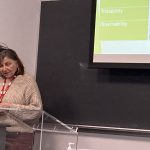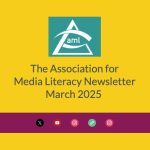An Overview of a Conversation with Len Masterman
Len Masterman’s most recent work has focused on developing the new Media Studies syllabus for the Northern Examinations and Assessment Board (England). He spun a cautionary tale of the evolution of Media Studies in this Board (in fact, in Britain) in order to drive home to us the very real danger in allowing Media Studies to diminish to a mere dot in the curriculum. In 1990 in Britain, the Thatcher government policies had allowed the curriculum to virtually disappear from the curriculum. Despite the fact that Maggie Thatcher considered A-levels the ‘gold standard’, – the ‘passport from the middle and working class to Oxbridge and good degrees’ – the ‘distributor of good degrees’ – Len sees his purpose in designing a good syllabus as the ‘Trojan Horse that will subvert the A-level system – the spark that will send the whole thing up for good.’ He sees this as being accomplished by devising exams to keep ahead of teachers teaching to the test, and the student who wants to learn parrot fashion, thus satisfying both those who do not understand the nature of learning and those who understand it implicitly.
The problems with the old syllabus were that the aims and objectives were fuzzy and vague. Some examples are: ‘ to contextualize the study of the media’, and ‘to promote a critical appraisal of the historical and current organization of media institutions.’ One would think that these aims were designed deliberately broad enough so that anyone could work with them, and fit them to their own purposes. The problem is that they are intimidating; one feels that one would never quite achieve them, once one understood what they meant! And so what many teachers, especially those with less experience, tend to do, is to focus on content which merely skims the surface because the aims are not clear enough.
Len quite rightly clarified for us that aims have to be really clear, straightforward, and achievable. We have to use methods of evaluation that will really test the achievement of the aims. He saw a need to produce a syllabus with meaning for the student, one that would produce critical autonomy and help the student to read between the lines of a media text, giving them access to our culture’s major symbolic discourse. Content, therefore, takes a diminished role, and in fact there is no specific content.
Assessment strategies include: a practical criticism paper, plus a look at four or five ‘Studies in Depth’, which look at a particular area of focus. In sum, the testing of the syllabus discourages the recall of alienated information, rather encourages the recall of meaningful experience. In sum the strategy is to teach through media text, but the ‘text is a pretext for getting at the principles.’
Part of the syllabus consists of a durational study, which may follow a particular title in the media and show how it develops over a period of time. Practical work also plays a part, and here Len was very clear about shortcomings in this area. So much, as we all know, depends on the technology available to us. The work needs to be solidly embedded in the student’s clear aims in creating the work: what do you want to say? Practical work, therefore, is assessed according to 1) technical competence, and 2) whether it makes sense, and whether it communicates effectively. Clearly, the new syllabus is an investigative one.
In summary remarks, and through the answering of some very focused and pointed questions, Len made some succinct, and very insightful (as always) comments on the nature of education and media studies. That Media Studies is popular because it is always relevant and interesting; that education is not something you do to people, they are not deficits that have to be compensated for, rather, ‘here are texts we can have a dialogue about.’ Media Studies helps students problematize their environment; in their ‘fascination’ with the content and the questions around it, they become motivated, and of course this always leads to the kind of critical autonomy Len is aiming for.
Finally, that the function of the teacher is to make available and range of ideas, analyses, and tools from higher education, (not in a top-down way, but ‘here are some to consider’.). It is up to students to decide if they are of any use.


